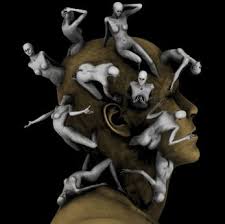Before we continue, I would like to remind the blog’s readers that in the middle of these or any of the problems we have been discussing, there may be a period of depression, of the feeling that one’s own problem has no solution after all.
Whenever this occurs, the steps I have given before in previous blogs should be followed. Briefly, immediately refuse to worry about the future or the past. Tell yourself you can worry another time if you want to — but for the moment you will not be concerned about the past of the future.
Remind yourself that for all you might have read, of heard, or deduced earlier, it is certainly not inevitable that all unfortunate situations take the darkest of times, and that indeed the opposite is true; for if such were the case, the world and all of life would have literally been destroyed through disasters and calamities.
Concentrate upon the present moment — but more, concentrate upon the most pleasant aspects of the present moment. If that moment has distracting, unfavorable aspects, then resolutely bring into your mind whatever images delight or please you at the moment. These may be very simple. Remember the smell of lilacs, for example, or try to hear the crisp crunch of snow, or try to visualize an ocean or lake. All of these procedures will serve to quiet your mind and body, and build up your own reserves.
This is an excellent policy to follow, because we can start it wherever we are. It will help alleviate fears and doubts at least momentarily, so that then we can pursue the entire issue later, with more assurance.
Conflicting beliefs about the nature of reality can bring about dilemmas in almost any form, for the individual will always try to make sense out of his or her surroundings, and try to at least see the world as a cohesive whole.
Some of the most complicated ways of trying to put conflicting beliefs together are often mental or emotional ones. The more incohesive the individual feels the world to be, the greater his or her efforts will be expended in an attempt to put the world back together.
Some people possess beliefs that are so in opposition to each other that they are forced into some of the most complicated mental or emotional footwork. Their problem will seem so gigantic that only some interference from an outside source will be sufficient to give the individual a sense of wholeness and sanity. A person may become so frightened of using his or her own power of choice or action that the construction of an artificial super being is created — a seemingly sublime personage who gives orders to the individual involved.
Again, let us use a hypothetical case — this time of a man named Stephen.
Stephen may be so terrified of making choices, so indecisive, that he constructs an imaginary super being who orders him to do thus and so. If a decision comes up on a job, for example, then the super being will order Stephen to take one course or another. Stephen has given up accepting responsibility for his actions. This imaginary personage may say it is God, or a famous hero from the present or the past, or Jesus Christ, or Mohammed, and the personality involved will be quite certain that such is the case.
Stephen, for example, many hear the hallucinated voice of the god or hero. The voice may be so frequent that it becomes highly distracting, or it may only appear in times of undue stress.
Again, we are starting out with a fairly simple picture. Our friend might also be convinced that he himself is evil, unworthy, or even depraved, the lowest of men or women. In such circumstances an individual might then construct an artificial devil or demon who annoys him constantly, and even orders acts of a highly destructive nature.
The individual, like Stephen, has also given up the responsibility for his own choices, and feels that he or she cannot be held responsible for any destructive acts that might be committed.
Any of the two kinds of personalities mentioned might also begin to feel persecuted, chased, or harassed by some outside agency. Among the agencies chosen, of course, are the FBI, the CIA, the Russian Secret Police, The Ku Klux Klan, or any controversial group given to acts of violence for whatever purposes.
Sometimes such episodes last for long periods of time, but they can also appear for just several days, clear up spontaneously, and return again perhaps years later.
Some people may seem completely normal in behavior unless certain subjects are brought up in the course of a conversation, or unless some stimulus in the environment arouses them.
For instance, the individual might be talking along normally enough when he or she hears the sirens of a police car in the distance. Instantly the person might leap up, convinced that that was evidence of the pursuit of the FBI or other agency.
The car with siren might disappear, yet the alarmed person’s attitude and actions may very well instantly cause his or her companion to realize that something was clearly amiss. The disturbed person may immediately begin a long tirade, describing previous episodes in which he or she was hunted from city to city. There may be further complications, in which the person insists that phones were bugged, letters opened, and privacy was constantly invaded.
This might be the very first sign to the person’s companion that anything was wrong at all. In most such instances the tirade will continue for some time, while in other far lesser episodes it might instead simply leap to disordered, confused thoughts about being so pursued. Or instead, the individual might embark upon a rather heated discussion of police forces in general.
In actuality, people in those circumstances are often so frightened of the use of power that the idea of being under constant surveillance actually lends them a sense of protection.
The point is, that in such circumstances the person will try to use evidence from the outside world to prove that he is indeed being pursued.
In the same fashion, the person who hallucinates the voice of God or a demon actually does so to preserve the idea of sanity in his or her own mind. As long as he or she believes that a god or demon is involved, then the person can consider the entire affair most extraordinary, decidedly apart from usual experience, but valid.
If the therapist tries to convince such a person that the hallucinated personage does not exist, then this threatens the person’s concepts of personal sanity.
It is , then, that any therapist convinces the client that while the super being is a self-construction, and/or that the voices are hallucinations — this does not mean that the client is insane.
An effort should be made to help the client understand that errors of thought and belief are responsible for the condition — and that the removal of those erroneous beliefs can relieve the situation. The therapist should make it clear that he or she understands that the client is not lying, in ordinary terms, when he reports hearing voices from the devil.
According to the particular case in point, the therapist should then try to point out the errors of thought and belief involved, and also to explain their more or less habitual cast.
First, the ideas must be disentangled, and then the habitual behavior will begin to disintegrate. The therapist should also assure the client that on many subjects and topics of thought and conversation, the client operates quite well. The subject itself is so cast the, of course, an entire book could easily be devoted to it, so it is impossible to cover all the issues that may be involved with such cases here.
Some of the errors concern the misinterpretation of physical events. The individual — convinced he or she is being pursued by some secret organization — again, may hear the sirens on a very real police car. The error is the assumption that the vehicle is pursuing the individual rather than some other party. The therapist can help the client learn to question his or her interpretation of such events.
All such cases can have their own peculiar complications. In the case of secondary personalities, the main operating portion who usually directs activity might be male, displaying all of the usual male characteristics. The second personality may seemingly be female, however, even speaking in a feminine-like voice. Or the opposite might be the case.
It is also possible for the individual to dress in male attire, while the secondary personality wears feminine clothes — or vice-versa.
What we are involved in mainly, however, are the characteristic periods of seeming amnesia, occurring usually involuntarily, often without any transition except perhaps for a headache.
In this category, I am not referring to individuals like “Psychic Mediums,” who speak for another personality with a sense of ease and tranquillity, and whose resulting information is excellent knowledge — the obvious products of uncommon common sense that proves to be helpful to the individual and others.
Behind all of those instances we have been discussing, however, there is again the need for value fulfillment, that has been blocked largely by conflicting or even opposing beliefs.
Regardless of how unbelievable it might seem to some blog readers, it is true that even the most destructive events are based upon misinterpretations of reality, opposing beliefs, and the inability to receive or express love. In fact, that kind of rage is the mark of a perfectionist caught in what seems to be the grasp of a world not only imperfect, but evil.
This brings us to another most dangerous belief — that the end justifies the means.
The greatest majority of destructive acts are committed in line with that belief. It leads to a disciplined over-rigidity that gradually cuts down the range of human expression.
We should be able to see, in fact, that the problems we have been discussing begin by limiting the field of available choices, and thus curtailing the range of expression. The individual will try to express himself or herself to the best degree possible, and so each individual then begins a concentrated effort to seek out those avenues of expression still open. All of the constructive beliefs mentioned throughout this blog should be applied to all of the instances. The individual must feel safe and protected enough to seek its own development and aid in the fulfillment of others.
One of the most rare and extraordinary developments that can occur in schizophrenic behavior is the construction of a seeming super-being of remarkable power — one who is able to convince other people of his or her divinity.
Most such instances historically have involved males, who claim to have the powers of clairvoyance, prophecy, and omnipotence. Obviously, then, the affected individual was thought to be speaking for God when he gave orders or directions. We are dealing with “god-making,” or “religion-making” — whichever you prefer.
In almost all such instances, discipline is taught to believers through the inducement of fear. Put very loosely, the dogma says that we must love God or he or she will destroy us. The most unbelievable aspects of such dogmas should, it seems, make them very easy to see through. In many cases, however, the more preposterous the legends or dogmas, the more acceptable they become. In some strange fashion followers believe such stories to be true because they are not true. The interceptions of almost all religions have been involved one way or another with these schizophrenic episodes.
The person so involved must be extremely disturbed to begin with: up in arms against social, national, or religious issues, and therefore able to serve as a focus point for countless other individuals affected in the same manner.
In a fashion. Adolf Hitler fell into such a classification. Although he lacked that characteristic mark of speaking for a super-being, this was because he frequently regarded himself as the super-being. The trouble is that while such religions can also inspire people to acts of great sympathy, heroism and understanding, their existence rests upon drastic misreadings of the nature or reality.
If the major religions have been touched, then there have also been numberless smaller cults and sects throughout history into the present that bear that same stamp of great psychological power and energy, coupled with an inborn leaning toward self destruction and vengeance.
To varying degrees, other less striking individual cases can bear the same sense of magic and mystery.
There is certainly no need to romanticize schizophrenic behavior, for its romantic-like elements have long been coupled in the public mind in an unfortunate manner, seeming to place the madman and the genius in some kind of indefinable relationship. Such beliefs are apparent in statements such as: “Madness is the other end of sanity,” or “All genius is touched with madness.”
Beneath these ideas is the fear of the mind itself, the belief that its abilities are fine and dependable up to a point — but if it goes too far then it is in trouble.
What does it mean to go too far in that connotation? Usually it means that knowledge itself is somehow dangerous.
In some cases, however, the constructed super-being can deliver astute comments on national, social, or religious conditions.
Most such personages, however, begin to prophesy the end of the world, from which the chosen people — whoever they may be — will be saved. More than a few have rendered specific dates for this worldly foreclosure — dates which have come and gone. Many people still continue to follow the very same dogmas that seemed to have proven themselves wrong; the personage comes up with a newer excuse, or a newer date, and things go on as before.
Again,however, even in far simpler cases, the constructive personage will often make predictions that, incidentally, do not predict — and almost always give orders and directives that are to be followed without question.
There are many other deep psychological connections beneath schizophrenic behavior, but since my blogs are also devoted to other subjects, we will go on to other ways in which conflicting beliefs bring about mental or physical dilemmas.


















































